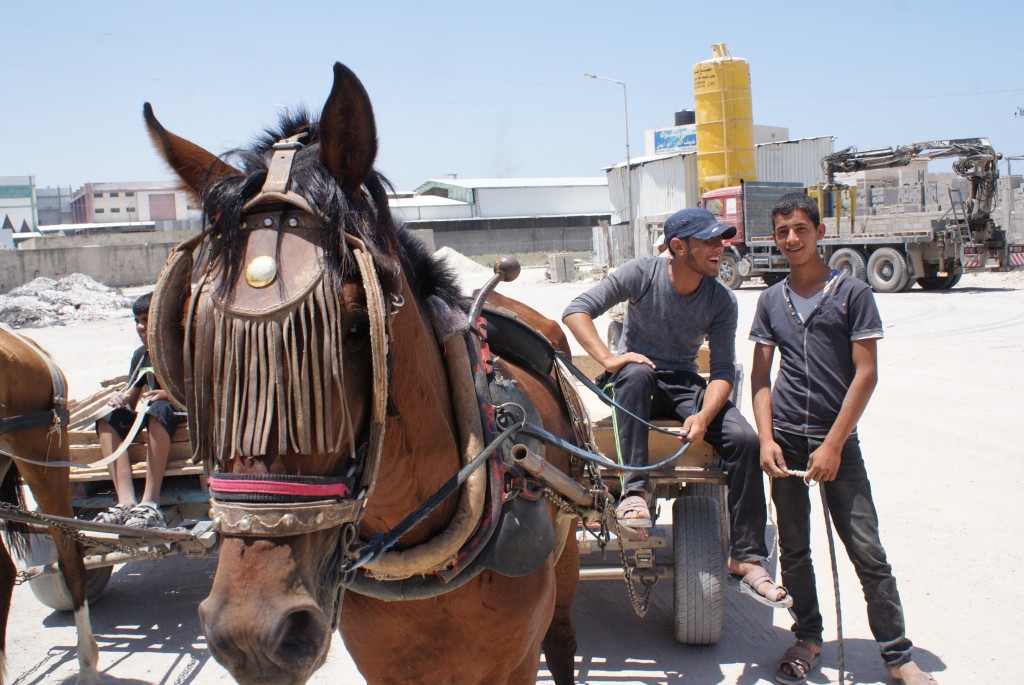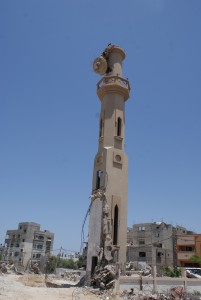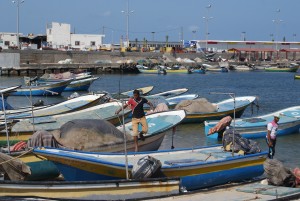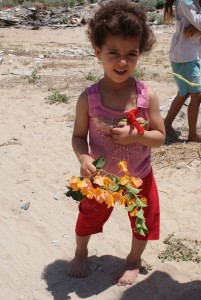One year on: Gaza, life with hard labour
By Khaled Diab
With rubble the only growth industry in Gaza, people are unable to pick up the pieces of their broken lives, face psychological ruin and dream of escape.

Friday 10 July 2015
You can call them rubble rousers. Unlike the iconic image of Palestinians throwing rocks at Israeli tanks, these destitute men have found a new calling: navigating the many ruins of Gaza created by last summer's war. With heavy hammers and pick axes, they smash away the concrete from around the steel rods, which are too valuable for the owners to allow these rummagers to take.
A train of horse- and donkey-drawn carriages makes its way to an industrial crusher that recycles Gaza's rubble into gravel which can be used in repair and reconstruction work. Although a small cartload of concrete fetches only $2 and a collector can expect to net $5-6 for an 11-hour day after deducting food for his animal, there is no shortage of people “willing” to undertake this backbreaking labour.

With the World Bank reporting that Gaza has the highest unemployment rate in the world, reaching a whopping 60% among youth, not to mention all the people in work who are not being paid, rubble is one of the few growth sectors in Gaza's besieged and battered economy, which is still largely sealed off from the outside world.
“What I make isn't enough for anything,” admits Rushdie, a man who says he is 30 but looks about 45. “But this work gets me out of the house.”
Since the war, many young people have dropped out of school or college to help support their homeless and destitute families. “Before the war, I was studying mathematics at al-Quds Open University,” explains Mo'tasim, perched casually against his cart wearing a baseball cap, his cheery demeanor and smiley visage contrasting sharply with the ruins of Beit Hanoun which were pummeled heavily during the war.
“I've discontinued my studies for now because we need money,” he adds, explaining that his family had lost their home and were being housed in an UNRWA school until his brother got burnt in an accident. Now 15 of his family members are living together in a single room in a damaged building.
But you don't need to be a mathematician like Mo'tasim to figure out that the situation in Gaza has become completely hopeless. When asked whether he had lost hope for the future, Mo'tasim laughed: “What hope? We had no hope to lose in the first place.”
Still, the young man has not abandoned his modest dreams of finishing his education and landing himself a dignified job. But like other youth in Gaza, the war has prompted him to do the maths and conclude that the only way is out. “If I got the chance, I'd leave Gaza and never return to Beit Hanoun,” Mo'tasim maintains.

And Mo'tasim is no lone wolf, this urge to take flight affects young people of all walks of life. “I swear to you, if they open up the crossing and give us opportunities to emigrate, not a single young person would remain in Gaza, not even those with jobs,” claimed one unemployed graduate who had borrowed money to pay smugglers to get him to Italy but was caught in Egypt and deported back to Gaza.
“To sit home and wait for death, that is the definition of injustice,” he emphasised.
And this sense of hopelessness and powerlessness is common. While the post-traumatic stress epidemic among Gaza's children following the 2014 offensive has received wide attention, less visible is the impact of the conflict on grown-ups. “When you have an adult in the situation we have in Gaza,” says Hasan Zeyada, a veteran psychologist at the pioneering Gaza Community Mental Health Programme (GCMHP), “this creates a feeling of impotence.”
“Gaza has endured multiple losses, what we call multi-traumatic losses,” elaborates Zeyada, who suffered just such a series of misfortunes when he lost his mother and five other close family members during an Israeli airstrike. “People in other places usually endure a single loss: the loss of a home, or a family member, or a job. Many Gazans have lost them all.”

Talk of post- or pre-trauma is futile, as trauma is constant and ongoing, not to mention multiple, some experts point out. This long-term, continuous stress has resulted in a growing plethora of psychological difficulties. These include low self-esteem, self-blame, displacement of anger, anxiety, panic attacks, obsessive compulsive disorders, mood swings and full blown depression.
The unending, prolonged psychological strain, along with reluctance to consult mental health specialists, also lead to somatoform disorders, which are phantom physical ailments caused by underlying psychological conditions, which cause the sufferer additional psychological distress.
Thanks to the work of the GCMHP and other programs, awareness is rising of mental health issues and the stigma is much less than before, says Zeyada.
But Zeyada warns that there is little he and his colleagues can do beyond providing the psychological equivalent of a band aid, as long as the underlying causes are not addressed. “Without an enhanced socio-economic and political reality, you can't talk about mental health,” he notes. “Mental health in Gaza is connected to human rights.”
And if nothing happens? Not only will Gaza turn into a completely uninhabitable space, Zeyada argues, a lost generation of traumatised and terrified children will reach adulthood: “How are you going to convince this generation tomorrow that there can be something called peace?”
____
Follow Khaled Diab on Twitter.
This is the extended version of an article which first appeared in Haaretz on 1 July 2015.



Thanks for reporting and testifying, Khaled
hope and justice is the only way…wars are never won!
Beautiful writing by Khaled Diab. Unfathomable reality.
For me, the most beautiful and magical thing about children is the purity of their spirit, their ability to dream without limitation and their capacity for hope.
Khaled Diab’s piece, one year on from Israel’s bombardment of Gaza, reveals how hope, dreams and life has been crushed in Gaza. We should hang our heads in shame.
“To sit home and wait for death, that is the definition of injustice,”
Khaled, I read your fine article on life in Gaza today. What are we to take away from it (ie., is further “war” more or less likely to occur because of it, like in Lebanon after 2006)?
Thank you Kahled for this sad report.
En wat wordt het als IS overneemt van Hamas? Nog véél erger.
very interesting